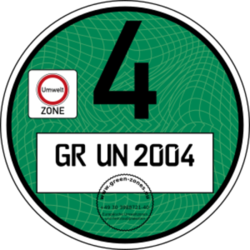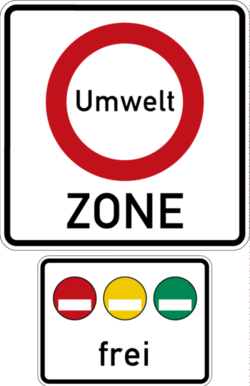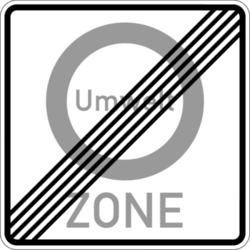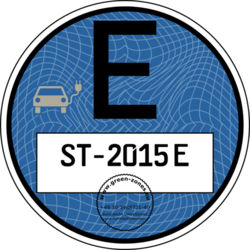In 2013, the Baden-Württemberg city of Ludwigsburg joined forces with several cities and municipalities to form a regional environmental zone. Ludwigsburg, Markgröningen, Pleidelsheim, Freiberg am Neckar, Ingersheim, Kornwestheim, Asperg, Möglingen, Tamm and Bietigheim-Bissingen, Remseck am Neckar and the district of Kornwestheim-Pattonville form a large common zone.
Name of the environmental zone: Environmental Zone Ludwigsburg and surrounding – Germany
Date of entry into effect of the zone: 01-01-2013
Type of environmental zone: Permanent
Not allowed to drive (temporarily): Information currently unavailable
Not allowed to drive (permanently): Vehicle class: car, motorhome (M1), bus (M2, M3), van (N1), truck (N2, N3)
Fuel type: all
Euronorm: 0-3 (diesel), 0 (petrol, LPG)
Sticker/registration/application: Entry only with sticker (green)
Fines: 100 euros.
Area/extension of the environmental zone: The environmental zone ‘Ludwigsburg and surrounding’ encompasses the following cities and municipalities: Ludwigsburg, Markgröningen, Pleidelsheim, Freiberg am Neckar, Ingersheim, Kornwestheim, Asperg, Möglingen, Tamm and Bietigheim-Bissingen, Remseck am Neckar and the district Kornwestheim-Pattonville.
Special features: Retrofitting allowed: yes (PM)
Contact of the environmental zone and exceptions: Administrative district office Ludwigsburg, Department construction and emission control: [email protected]; Phone: 07141/144 7722
Exemptions: Doctor, Disabled vehicle, Fire brigade, Military, Mobile cranes, Vintage car older than 30 years, Police car and Ambulance
Environmental zone (green)
Do I need stickers or registrations?
To enter an environmental zone, each vehicle concerned requires a valid green environmental sticker. Otherwise, a fine of 80 euros plus 25 euros processing fee is to be expected.
How do I recognize the low emission zone?
The green environmental zone can be recognized by the traffic signs 270.1 and 270.2.
In front of each zone there is the sign 270.1 with an additional sign for the permitted sticker.
The end of the low emission zone is shown by the sign 270.2.
In our Green Zones App we have a detailed map of each low emission zone. So you can easily see the boundaries and avoid penalties.
Are there other low emission zones in Germany?
Yes, a lot of them. With over 80 different environmental zones, Germany has one of the most in Europe.
In our Green Zones App we have gathered together all the low emission zones in Europe and presented them clearly.
Electric cars
Is there a sticker for electric cars?
Yes! However, the sticker for electric vehicles is not intended for everyone. If the vehicle is registered in Germany, the last character on the license plate can be an "E". However, if the vehicle is registered abroad, an electric sticker (E-sticker) is required.
What advantages do I have with an E-sticker?
The E-sticker gives you various advantages. Depending on the municipality, there are various advantages, such as the use of bus lanes, free parking on the road and at electricity charging points, as well as the possible use of otherwise closed roads.
Do I need a green environmental sticker despite the E-sticker?
Yes, every car, no matter whether it is being driven on with petrol, diesel or electricity, requires a green environmental sticker according to the law. The E-sticker also entitles you to additional advantages over non-electric vehicles. The 35th BImSchV does not provide a separate paragraph for electric vehicles, which regulates them as an exception. Therefore: If an electric vehicle drives into a green environmental zone without a green sticker, a fine of 80 € + approx. 25 € handling fee must be expected.
Good to know...
All current driving bans and further information are available in our Green-Zones App.
Are night-time environmental zones coming?
The Berlin Green Party recently presented a proposal to equalise the traffic congestion in the capital. The idea is to shift delivery and commercial traffic to the night-time hours. According to Antje Kapek, transport spokesperson for the Greens, this proposal should help to ensure that delivery vehicles, refuse collection, care services and doctors get stuck less in congested and parked-up streets during the day. Low-noise and low-emission lorries could increasingly drive into cities at night and on special routes.
Bicycle instead of car - Paris in transition
A study by a public foundation has shown that more than one in ten journeys in Paris and the surrounding area are made by bicycle. This is a remarkable increase compared to 14 years ago, when less than one in thirty journeys were made by bike. Paris seems to have been endeavouring to change its transport policy for years. With more cycle paths and cycle lanes, fewer car parks and higher parking charges, the city is trying to promote cycling and reduce car traffic. But what does this mean for the existing low emission zone?





![[Translate to Englisch:]](https://www.umwelt-plakette.de/fileadmin/_processed_/8/3/csm_screenshot_2024-04-18_125614_c7d9eca4a5.png)
![[Translate to Englisch:]](https://www.umwelt-plakette.de/fileadmin/_processed_/2/0/csm_screenshot_2024-04-18_121908_5e1053efaf.png)